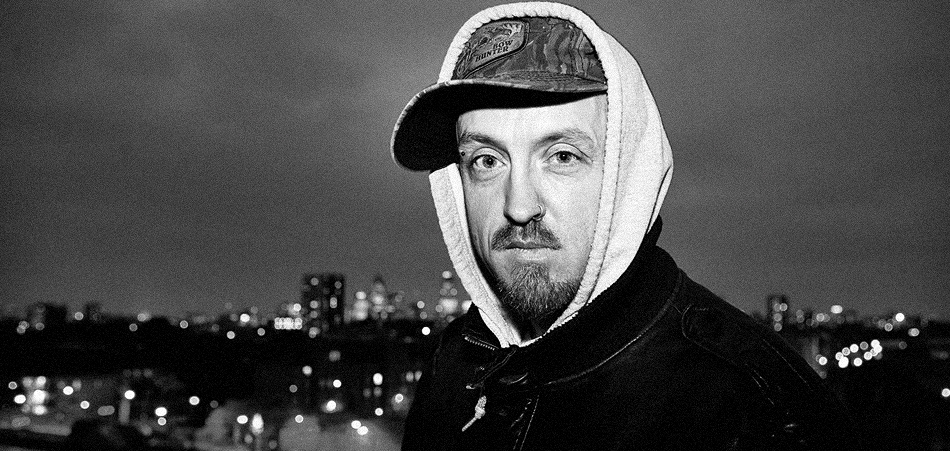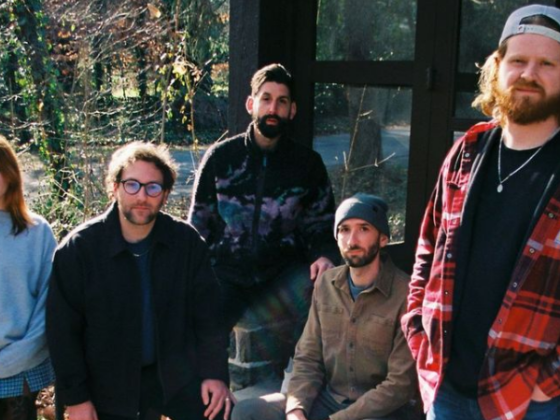Kevin Martin is a man of many masks, all of them twisted and disturbing in some way. Starting in the experimental noise Napalm Death off-shoot Godflesh, moving on to the punishing, bass-bombed hip-hop of Techno Animal before settling on his most well known incarnation, the digital dub megalith known as The Bug, Martin has made good friends with all that is brutal and uncompromising. His new album under The Bug moniker, Fire, is an unsurprising continuation of the bleak aural outlook which dominates Martin’s past work, but here it has evolved into something truly horrifying. This is The Bug’s first solo album since 2014’s Angels & Devils, and he has assuredly not come for shenanigans. Eschewed are the more melodic aspects of some of his many recent projects, and it’s a welcome if expected return for the bass which clearly has no regard for audio systems or their wellbeing at all and a general sense of the world collapsing around us, at least more than usual.
Fire is a gruesome, distorted, rumbling smoggy smear over the urban blight, intent on making the listening experience as draining as sonically possible, both emotionally and physically, while still being enjoyable on a surface level. A good musician should adapt to the times they are performing to, and The Bug has matched the aggression being put into the world by tyrannical agitators with an apocalyptic thud of an album. Everything he has become renowned for is put through 3 compression units and a distortion pedal to create this unholy bastard. The album starts with an intro featuring Martin’s cohort in King Midas sound, award-winning poet Roger Robinson. Over a chamber music soundscape, Robinson recites a sombre vision of dystopia and the bars are coming down, the ride is starting.
Long-time Bug associate Flowdan, who featured on one of his biggest songs, “Skeng”, is out in fine form to kick off the album proper on “Pressure”. The production is a delightful onslaught to the senses, a blaring horn serving as an entrée before the bass attack and reverb-drenched drums go off-road with it. Flowdan, a veteran in the grime scene, shows his considerable experience and shuts it down. If anything, his flow has only grown skippier over time. As he rails against the government, poverty, racism and inequality, it’s clear this isn’t just a post-apocalypse pity party. There is a lot of pent up rage which needs a big red target. Flowdan doesn’t hide behind literary devices, he hits the problems at their core.
“We don’t argue about tax
People are dead, mum’s still crying
The fire’s gonna blaze on these aristocrats”
Everything Kevin Martin makes seems to carry a vague scent of late-80s punk agit-prop, and this fuels much of the vitriol stoking Fire. His guest selection is also impeccably curated. After Irah drops a brooding, sinister vocal performance on the digital dub free-for-all of “Demon”, visionary Philadelphia poet and musician Moor Mother appears on the track “Vexed” and makes it very clear that her current tolerance for shenanigans matches that of The Bug. As chewed up samples echo and rattle, Moor Mother cuts through the audio soup to remind us why fucking with her is ill-advised. Poets feature heavily in Martin’s catalogue, the theory being that only they can handle the crushing emotional weight of his dubplates.
Further credence is given to this theory when Jamaican poet Nazamba contributes to the great tradition of anti-war anthems on “War.” Is it possible to feel claustrophobic when surrounded by only bass waves? “War” would seem to suggest so. As Nazamba snarls “Ideological war” while doom in a dub version gives the track the sub-level resonance it deserves, the anger in the song is inescapable and it forces the same righteous rage from the listener. If you are caught with a Molotov cocktail in a bank, please do not say you took inspiration from The Bug or indeed mention him at all. Wipe his songs from your computer. Subversive music is historically a touchy subject for Orwellian thought police.
Flowdan’s former Roll Deep crewmate Manga St Hilare gets busy over a disarmingly sparse rhythm on “Bang”, effortlessly gliding over the rubble left behind by The Bug with nonchalance. The paradigm created by the industrial clatter of the beat and the calmly self-assured verses could quite easily opened some kind of interdimensional rift. At the same time, it is a brief moment of levity. This leads nicely into the subtly-named, Daddy Freddy-featuring “Ganja Baby”, a touching ode to horticulture which again decides the direct approach to be favourable. The song starts with the line, “I am an upfront cannabis smoker”, a lyric so beautifully blunt it shows up allegory as the bloated diva it is. The bass is a little less punishing in this track to match the mood. I could swear I heard a bounce in there at one point, but that could have been my imagination or my neighbours playing Sean Paul.
The last stretch of the album is where it all gets laid on the line and bursts through whatever wall or societal restriction it had been headbutting for the past 30 minutes, ready to direct any complaints to the relevant department. These complaints are first addressed in the sinister drone of “Fuck Off”, in which Logan displays thoroughly convincing animosity towards the opps over a relentless bass rumble and militant drum patterns. Flowdan then makes his glorious return and gives Fire a late track-of-the-album contender, if such a thing were pertinent. “Bomb” is an absolute animal, much like “Pressure”, and Flowdan paints such a vivid depiction of the everyday hopelessness and frustrations which have become pillars of modern society that pretending it’s not happening is not provided as an option. As a listener, if you want to enjoy the filthy bass, you have to share the incendiary rhetoric as well, it’s a package deal.
Fire goes full rotation and finishes the way it started, with Roger Robinson gently rolling some truth grenades in our direction. On “The Missing”, we hear a heart-breaking account and call to action on behalf of the victims of the Grenfell tragedy in London, in which 72 people died in a tower block fire which was aided by combustible insulation installed by slumlords and ignored by a Conservative government. Grenfell has unwittingly become a symbol for the deadly real-life consequences of an economic system which flourishes most in times of unspeakable horror, which should by all rights justify a little recall and review. The Grenfell Foundation is currently taking donations to help families left homeless by the fire.
In this album, The Bug has managed to give his fans what they had come to expect while showing a glimpse at an uncertain future and distilling the outrage of life under long-standing totalitarian regimes, which have been this way long before Covid. Every track on this album has a purpose and every one bangs in the way it is intended. In uncertain times, at least we can rely on The Bug to drop grey concrete smoke towers of righteous indignation on our complacent heads, and rightly so. Go buy the album here and pre-emptively order some replacement speakers.









